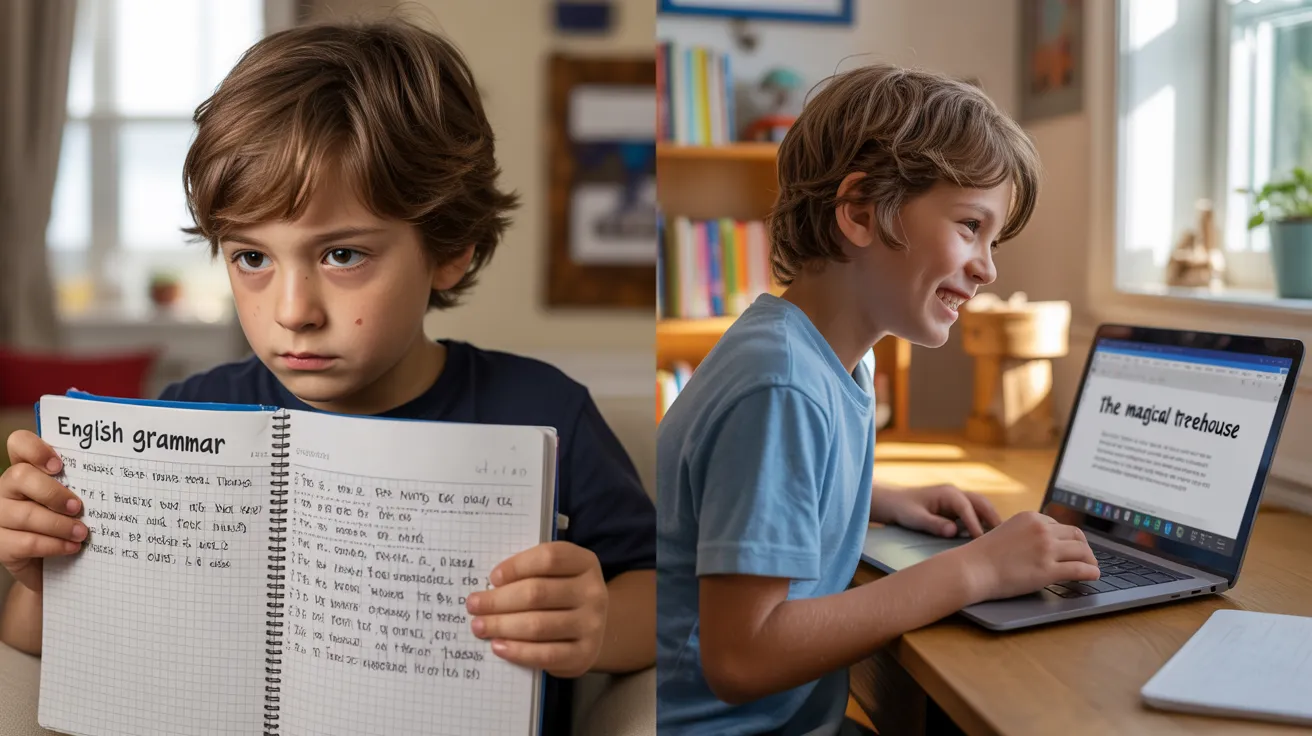Online English Classes That Build Creativity Not Just Grammar
Online English Classes That Build Creativity Not Just Grammar
When most people think about learning English, the first thing that comes to mind is grammar drills, worksheets, and endless corrections. Of course, grammar matters, but it isn’t everything. Real fluency comes when learners can use the language to tell stories, share ideas, and feel confident expressing themselves.
That’s why more online English classes are focusing on creativity. Instead of just repeating sentences, students are encouraged to write, speak, and even experiment with their own ideas. For kids, beginners, and even business professionals, this shift makes learning more meaningful.

These digital classrooms do more than fix mistake. They help students improve writing skills online, build stronger communication skills, and practice critical thinking. Through activities like storytelling, personalized learning plans, and creative writing, learners actually enjoy the process of learning English, not just memorizing rules.
Why English Learning Must Go Beyond Grammar?
Grammar gives structure, but communication requires much more than memorizing rules. Learners, especially kids and young students, need space to explore language creatively. Here’s why moving beyond grammar matters:
Confidence building: Students gain courage when they can speak English freely without the fear of small mistakes.
Stronger communication skills: Real-world conversations require vocabulary, tone, and fluency, not just correct tenses.
Better reading comprehension: Creative activities expose students to stories, essays, and diverse subjects, making reading more meaningful.
Critical thinking: Engaging in storytelling, debates, or creative writing trains the brain to analyze and form ideas clearly.
Career opportunities: For business professionals, skills like small talk, storytelling in presentations, and strong writing create advantages in the workplace.

In short, grammar may be the skeleton, but creativity and communication are what make the language come alive.
How Creative Online English Classes Build Expression?
Creative online English courses bring imagination into the classroom. Instead of only filling out grammar worksheets, students play with words, practice communication, and create original ideas. Common methods include:
Storytelling sessions: Students invent and share their own stories. This builds vocabulary, improves listening skills, and makes learning fun.
Collaborative writing projects: Working with peers encourages teamwork, helps learners see different styles, and improves writing skills naturally.
Drama and role-play exercises: Students act out conversations, preparing them for real-life situations such as small talk, interviews, or business English meetings.
Creative prompts and freewriting: By responding to open-ended prompts, students can practice English writing without overthinking grammar mistakes.

These online classes offer immediate feedback from teachers, ensuring learners improve English skills while still enjoying freedom of expression.
Key Features of English Learning That Improves Writing Skills Online
Not every online class is designed the same way. The best English courses combine structured grammar lessons with activities that improve writing skills online and encourage creativity. Look for these key features:
Personalized learning plans: Every student learns differently. Customized lessons based on student level help both beginners and advanced learners grow.
Interactive writing tasks: Instead of memorizing rules, students write essays, blogs, or fun stories that strengthen English writing.
Multimedia tools: Videos, images, and storyboards inspire students to create. Technology makes lessons engaging for kids and non native speakers.
Focus on clarity and voice: Good teachers highlight the importance of communication skills and ideas, not just fixing mistakes.
Practice with feedback: Learners improve faster when they receive immediate feedback and know how to correct themselves.

With these features, online English classes become more than a grammar drill, they turn into a space where students can learn, create, and speak English confidently.
Best Practices to Improve English Writing Skills in Digital Classrooms
Parents, teachers, and students themselves can make digital English learning more effective by following a few best practices:
Encourage daily journals – Writing one page a day builds routine and fluency. Even beginners benefit by writing short sentences.
Provide creative prompts – Prompts like “Imagine a new world” or “Write about a conversation with your future self” stimulate imagination.
Balance grammar and creativity – Lessons should mix sentence structure with creative writing for complete language skills.
Use peer review – Students learn by reading each other’s work, spotting mistakes, and giving suggestions.
Celebrate progress – Highlight ideas, vocabulary, and creativity, not just accuracy. Encouragement motivates learners to practice.

These simple steps help students practice vocabulary, writing, and communication without feeling trapped by grammar drills.
Online English Learning That Encourages Thinking Creatively
When people think about learning a new language, they often picture endless grammar drills. But creativity changes the whole experience. In online classes, the focus can shift from repeating rules to actually using English in ways that feel real.
Critical thinking: Take critical thinking, for example. A student might read a short story and then question the choices a character made. That discussion is less about “right or wrong” answers and more about practicing English writing and learning how to form ideas clearly.
Imagination: Creativity also shows up in imagination. Some lessons ask learners to build characters, invent small conversations, or even share quick stories from their lives. Non native speakers often enjoy this because it feels closer to real communication than just filling in blanks on a worksheet.
Problem-solving: There’s also a problem-solving side. A single prompt, say, “write about your dream city” can produce ten completely different answers. Students learn there isn’t just one correct word or phrase, which builds confidence and makes small talk or business English less intimidating later.
Individual expression: And of course, there’s individual expression. A native speaker may write an essay in one style, while another learner might create something more visual or personal. Both are valid. What matters is that online classes give room for personal voice, not just perfect grammar.

In the end, this approach lets learners practice English as a living language used in conversations, storytelling, and even casual exchanges, rather than as a set of rigid rules.
Conclusion
Online English classes today offer far more than grammar exercises. With the right lessons, students learn to express themselves, create stories, and improve writing skills online while also mastering grammar and vocabulary. By combining creativity with structure, learners from kids to business professionals, can build stronger communication skills, develop confidence, and prepare for academic or career opportunities.

The future of English education lies in digital classrooms that value storytelling, critical thinking, and creative writing just as much as grammar rules. When students enjoy learning English, they don’t just memorize words; they learn how to use them to speak, write, and connect with the world.
Online English Classes - FAQs
How online English classes help kids think creatively?
Creative English courses use storytelling, role-play, and freewriting exercises to engage imagination. Instead of repeating grammar drills, kids explore ideas, build vocabulary, and learn to speak English confidently through fun activities that make learning enjoyable and effective.
How do online English classes improve writing skills online beyond just grammar?
By combining grammar with expression, these classes encourage learners to write essays, stories, and reflections. With immediate feedback, students refine their writing skills, gain confidence, and learn to balance accuracy with creativity in real-world communication.
What makes creative online English classes different from traditional grammar-focused lessons?
Traditional classes focus heavily on correcting mistakes, while creative classes mix grammar with storytelling, conversations, and role-play. This approach helps learners use English in practical settings, improving fluency and critical thinking while keeping lessons fun and engaging.
Can these classes help kids develop critical thinking while learning English?
Yes. Activities such as debates, persuasive writing, and analyzing stories require students to form opinions, compare ideas, and express thoughts clearly. This strengthens both language skills and broader academic abilities needed in school and university.
How can parents support children in improving English writing skills online?
Parents can help by encouraging daily practice, setting aside a quiet study space, and reviewing stories or writing tasks with their child. Even if they are non native speakers, they can support learning through conversations, feedback, and celebrating progress.
How frequently should students practice creative writing in online English classes?
Short, regular practice sessions, 3 to 4 times a week are ideal. Writing for 15–20 minutes per session helps students build fluency and confidence without pressure. Consistency matters more than long sessions, ensuring steady improvement in writing and communication.
How do creative online English classes help kids who struggle with traditional grammar lessons?
By shifting focus from strict grammar to fun, expressive activities, struggling learners feel less pressure. Through storytelling, role-play, and creative prompts, students gain confidence, practice communication skills, and naturally improve grammar in a supportive environment.
Comments
Your comment has been submitted